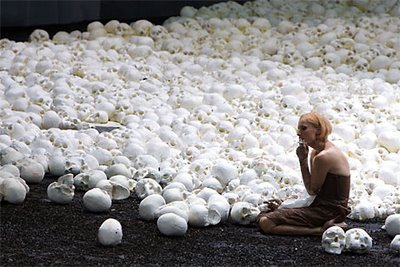Bavarian State Opera's Macbeth
As long as Zeljko Lucic and Nadja Michael take the lead roles as Mr. and Mrs. Mayhem in Munich's new Macbeth, the response will be divided equally between delight and disgust. The production has been stirring emotions and drawing a heated response from audiences and critics.
Delight in Michael's ravishing interpretation of Lady Macbeth, a woman who finds plotting to be an (a)rousing activity. From limber acrobatics in the lowered chandelier to her wildly vibrating yet piercing voice, she played a Lady Macbeth to murder for.
Disgust at the band of extras and chorus members that director Martin Kušej sends downstage to urinate all over the place at the opening of the third act. Choreographed urination is such a clichéd element in European Verdi direction. When 13 topless playboy bunnies with pink wigs appeared shortly after, a smart aleck yelled “bravi”, creating unusual audience merriment for a performance of Macbeth.
At this point, the show was on the verge of being hijacked by the audience; laughter, lusty boos from every tier, and blatant chatter created a casual, irreverent atmosphere rarely encountered in modern opera houses. Slightly rowdy, perhaps, but enjoyable.
As enjoyable as Zelijko Lucic, the Serbian baritone who sang Verdi, his voice ringing effortlessly through the round of the Staatsoper. He out-sang even the very fine Banco of Roberto Scandiuzzi whose severed head would become the play-toy of Lady Macbeth.
And as enjoyable as the homogenously played Bavarian State Orchestra under Nicola Luisotti who got a salvo of boos. His nervous, restless reading that had all the accents in the right places and deserved more bravos than boos.
Kušej (whose Salzburg La Clemenza di Tito is my measure of direction excellence) and his stage designer Martin Zehetgruber created many fine views: including the vast field of skulls and the walls of plastic sheets (á la Guy Ritchie’s “Snatch”).
Photo credit: Wilfried Hoesl





0 Comments:
Post a Comment
<$I18N$LinksToThisPost>:
Create a Link
<< Home